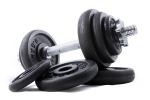- FreeTrainers.com Forums
- General Fitness & Exercise
- Diet issues
Group: General Fitness & Exercise
Created: 2011/12/31,
Members: 383,
Messages: 54581
Various general exercise related discussions. Find out what it takes to reach your fitness goals through daily effective exercise. With so many options we try to find out what works best.
Join group
Diet issues

gary.hopewell
Posts:
4
Joined: 2006/07/07  |
2006/07/27, 08:48 AM
I am in the military in Afghanistan, to that end, I dont get to pick my own diet. Add in the fact that I am a fairly picky eater, Im curious how much of an uphill battle I am facing? I work out 6 days a week, 5 of those are weight train followed by cardio, and 1 is just a slow fat burn for 30-45 mins. I am making gains in the gym, but I know diet is a KEY component in overall fitness. Most of our meals are loaded in calories / carbs/ fats, and its not always easy to get a meal that is good for me. I know I am not wasting my time, but any advice is helpful. I am currently running about 6'2, 210, and want to get down to 190. I am on the lose fat, gain lean muscle plan from here and follow it as best I can with what I have. Should I expect the 2-3 pound loss a week with a crap diet, or will it be less?
Gary |
|
| |

evol_js
Posts:
111
Joined: 2006/03/19  |
2006/07/27, 12:17 PM
It'll probably be less. You'll eventually hit the point where you stop seeing big muscle gains because you don't have enough healthy calories to keep building more than you're burning with your cario.
Just keep it up, work with what you got.. better than nothing. |

bb1fit
Posts:
11,105
Joined: 2001/06/30  |
2006/07/27, 01:30 PM
Well, if your meals are as you say, simply eat less of them. Is it a rule you have to finish your plate? Research actually shows that more frequent meals, while a good thing, does not necessarily translate to immediate fat loss. A calorie deficit of any kind, whether you eat 3 meals per day or 7 will yeild results.
The body is smart, and will adapt to your eating methods over the long term. There is some banter about metabolism being effected if you don't eat every 3 hrs. or something, but this came out of the bodybuilding archives who figure, the more you eat, the more of their protein, etc. you will consume. Metabolism just does not vary that quickly(i.e...between meals). Chances are good that if you are eating whole foods, your last meal is not totally digested in 3 hrs. anyway. If you think about it, some of the best eastern block athletes that still hold records to this day probably ate whatever was put in front of them when they could, and I am quite sure did know the difference between whey protein and casein protein. -------------- Maximus from Gladiator....Strength and Honor! |

gary.hopewell
Posts:
4
Joined: 2006/07/07  |
2006/07/27, 02:44 PM
Thanks for the responses. I do not have to eat everything, and have been careful to limit my intake, actualy, I think I was getting to few calories for a while. I am now trying to stay around 2000, and have done that by adding in a mid morning and mid afternoon snack, cashews, protein bar / shake etc. If I keep my calories below but not too far below my daily required, even though its not the "right" calories, I will still see gains in the form of loss, yes?
Gary ============ Quoting from bb1fit: Well, if your meals are as you say, simply eat less of them. Is it a rule you have to finish your plate? Research actually shows that more frequent meals, while a good thing, does not necessarily translate to immediate fat loss. A calorie deficit of any kind, whether you eat 3 meals per day or 7 will yeild results. The body is smart, and will adapt to your eating methods over the long term. There is some banter about metabolism being effected if you don't eat every 3 hrs. or something, but this came out of the bodybuilding archives who figure, the more you eat, the more of their protein, etc. you will consume. Metabolism just does not vary that quickly(i.e...between meals). Chances are good that if you are eating whole foods, your last meal is not totally digested in 3 hrs. anyway. If you think about it, some of the best eastern block athletes that still hold records to this day probably ate whatever was put in front of them when they could, and I am quite sure did know the difference between whey protein and casein protein. ============= |

evol_js
Posts:
111
Joined: 2006/03/19  |
2006/07/27, 02:44 PM
Hm, so you're saying that if I eat small meals throughout the day then say at... 3 I go somewhere and am unable to eat again until 8.. if I just eat a larger meal than usual it wont affect my metabolism at all?
I feel so hungry if I don't eat every few hours now that I got used to it.. I figued that means I need to eat more often to keep my metabolism going faster. |

bb1fit
Posts:
11,105
Joined: 2001/06/30  |
2006/07/27, 06:31 PM
Here is a couple examples of "extreme" weight loss and regain folks(who would of course go much longer between meals to achieve these results..no metabolic change...RMR was shown). Notice RMR was reduced no more than .05!
Resting metabolic rate in weight-cycling collegiate wrestlers compared with physically active, noncycling control subjects. Melby CL, Schmidt WD, Corrigan D. Human Performance and Health Promotion Laboratory, Purdue University, West Lafayette, IN. To determine the effect of multiple cycles of weight loss and regain on resting metabolic rate (RMR), we compared RMR between 12 weight-cycling collegiate wrestlers (means age 19.4 y) with a minimum of three previous seasons of weight cycling and 13 weight-stable nonwrestlers of similar weight and body composition (means age 20.6 y). RMR was measured before, during, and after a 6-mo wrestling season. Wrestlers exhibited a significantly higher baseline RMR compared with the control subjects (p less than 0.05). During the season when wrestlers had lost weight for competition, RMR was reduced (p less than 0.05) but was not significantly lower than that of the weight-stable control subjects. After a season of weight cycling and the final weight regain, the wrestler's postseason RMR was similar to preseason values and higher than the postseason RMR of the control subjects (p less than 0.05). Participation in numerous cycles of weight loss and regain did not lower RMR in these competitive athletes, as has been previously suggested. PMID: 2393002 4: Can J Appl Physiol. 1993 Sep;18(3):291-303. Related Articles, Links Physiological effects of weight cycling in female lightweight rowers. McCargar LJ, Simmons D, Craton N, Taunton JE, Birmingham CL. School of Family and Nutritional Sciences, Univ. of British Columbia, Vancouver. Repeated cycles of weight loss and regain are referred to as weight cycling. It is a practice of many athletes who must achieve a low body weight. The purpose of this study was to determine whether a history of weight cycling results in sustained metabolic changes. Healthy female rowers with a history of dieting and weight fluctuation (n = 7) were compared to a control group of rowers who had never dieted (n = 7). Anthropometric and metabolic measurements were done at pre-, peak, and off-season during a 1-year period. At peak season the weight cyclers restricted their food intake and lost 4.2 +/- 1.8 kg, and subsequently regained 4.0 +/- 2.1 kg in the off-season. This was different from the controls (p = .003), who maintained a stable body weight at all times. No other group differences were observed. Resting metabolic rate (RMR) and triiodothyronine (T3) changed with time (p = .001, p = .000, respectively) in both groups, which appeared to reflect changes in fat free mass (FFM), not body weight. Long-term metabolic changes were not observed in these athletes. PMID: 8242008 -------------- Maximus from Gladiator....Strength and Honor! |

bb1fit
Posts:
11,105
Joined: 2001/06/30  |
2006/07/27, 06:35 PM
And for those that worry that cycling weight(yo-yo type dieting), what was once considered conventional wisdom that you would lose lbm, it has been shown to not be the case. Unless you are on some retarted diet with insufficient protein, you will be fine.
Effects of weight cycling on body composition. Prentice AM, Jebb SA, Goldberg GR, Coward WA, Murgatroyd PR, Poppitt SD, Cole TJ. MRC Dunn Nutrition Unit, Cambridge, UK. It is frequently claimed that weight cycling, or "yo-yo" dieting, causes an inappropriate and permanent loss of lean body mass (LBM). Data are presented from a rural African population that undergoes profound weight cycling caused by an annual hungry season. No detrimental effect on LBM was observed. Data are also presented from an 18-wk prospective study of moderately obese British women who underwent three cycles of VLCD-induced weight loss and subsequent relapse. The proportion of weight lost as LBM was no greater than predicted. A review of the published results from experimental weight cycling in small animals also shows a high level of consensus that cycling does not significantly alter body composition. We conclude that, although weight cycling may affect growth of young animals, metabolic efficiency, and health, these effects are not mediated through permanent alterations in body composition. Publication Types: * Review * Review, Tutorial PMID: 1615886 -------------- Maximus from Gladiator....Strength and Honor! |
